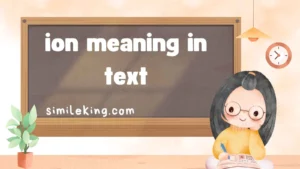When writing or speaking, variety in language helps maintain engagement and clarity.
One word that often needs variation is “however,” a common transition used to contrast ideas.
While “however” is useful, overusing it can make writing repetitive. Fortunately, there are numerous polite, professional, and casual alternatives that can serve the same purpose.
This article explores 10+ similes for “however,” offering nuanced alternatives suited for different contexts.
Whether you need a formal transition for a business report or a casual phrase for everyday conversation, this guide will help you choose the right expression.
🔹 What Is “However” and Why Do We Need Alternatives?
“However” is an adverb and conjunction used to introduce a contrast. It often signals a shift in thought, showing that something contradicts or differs from what was previously mentioned.
📌 Example:
👉 The weather forecast predicted sunshine. However, it started raining in the afternoon.
While “however” is grammatically correct and widely accepted, using it too often can make writing sound stiff or monotonous. Alternative phrases can help maintain a natural flow and prevent redundancy.
✅ When to Use Alternatives for “However”
Different alternatives work better in specific tones and contexts:
- Formal Writing & Professional Communication – Reports, emails, essays
- Casual Conversations & Informal Writing – Texting, blogging, storytelling
- Polite & Diplomatic Discussions – Business meetings, customer interactions
Now, let’s explore some alternative phrases for “however” and when to use them effectively.
🔹 10+ Alternatives to “However” with Examples
1️⃣ “On the Other Hand”
📝 Best for: Balanced arguments, professional writing
📌 Example:
👉 She loves city life. On the other hand, he prefers the countryside.
✔ Why Use It?: This phrase explicitly introduces an opposing point while maintaining a neutral and logical tone.
2️⃣ “That Being Said”
📝 Best for: Transitioning between viewpoints, adding emphasis
📌 Example:
👉 The new policy has some drawbacks. That being said, it has significantly improved efficiency.
✔ Why Use It?: This phrase helps acknowledge a previous statement while introducing a contrasting idea in a more conversational way.
3️⃣ “Nevertheless”
📝 Best for: Formal writing, essays, business reports
📌 Example:
👉 The project faced several obstacles. Nevertheless, the team delivered it on time.
✔ Why Use It?: This alternative is concise and sounds sophisticated, making it ideal for professional settings.
4️⃣ “Still”
📝 Best for: Everyday conversations, storytelling
📌 Example:
👉 She had little experience. Still, she managed to complete the task flawlessly.
✔ Why Use It?: “Still” is a shorter, more natural way to introduce contrast, making it suitable for casual speech and writing.
5️⃣ “Yet”
📝 Best for: Formal and informal settings, shorter sentences
📌 Example:
👉 The proposal was well-structured, yet the committee rejected it.
✔ Why Use It?: “Yet” is succinct and works well in both formal and casual writing.
6️⃣ “Conversely”
📝 Best for: Academic writing, structured arguments
📌 Example:
👉 Some people find early mornings productive. Conversely, others work better at night.
✔ Why Use It?: This alternative sounds scholarly and is often used in logical comparisons.
7️⃣ “Nonetheless”
📝 Best for: Emphasizing contrast in professional writing
📌 Example:
👉 The marketing budget was reduced. Nonetheless, the campaign was a success.
✔ Why Use It?: “Nonetheless” carries a stronger emphasis than “however,” making it effective for highlighting resilience or determination.
8️⃣ “Even So”
📝 Best for: Expressing contrast in everyday language
📌 Example:
👉 He apologized for the mistake. Even so, the damage was already done.
✔ Why Use It?: This phrase is great for casual and spoken English, maintaining a natural tone.
9️⃣ “At the Same Time”
📝 Best for: Indicating simultaneous contrast
📌 Example:
👉 He dislikes public speaking. At the same time, he enjoys leading team discussions.
✔ Why Use It?: This phrase shows that two contrasting ideas can be true simultaneously.
🔟 “Be That as It May”
📝 Best for: Formal discussions, polite disagreement
📌 Example:
👉 Your concerns are valid. Be that as it may, we must proceed with the decision.
✔ Why Use It?: This alternative adds a diplomatic touch to contrast statements.
🔹 10 Texting Examples Using Alternatives to “However”
Here are user-friendly texting examples showcasing these alternatives:
📱 1. I know it’s expensive. On the other hand, it’s a once-in-a-lifetime opportunity!
📱 2. That being said, I totally respect your decision!
📱 3. She’s always late. Nevertheless, she gets the job done.
📱 4. I don’t love sushi. Still, I’ll give it a try!
📱 5. The flight was delayed. Yet, we made it in time for the meeting.
📱 6. Conversely, I think staying in is way more fun than going out!
📱 7. It was a risky investment. Nonetheless, it paid off.
📱 8. Even so, I don’t regret my choice.
📱 9. At the same time, I totally understand where you’re coming from.
📱 10. Be that as it may, I still think we should consider other options.
🔹 How to Choose the Right Alternative for “However”
To pick the best alternative, consider these factors:
✅ Formality – Is it for a business report or a casual text?
✅ Emphasis – Do you want to strongly highlight the contrast?
✅ Flow – Does the phrase fit naturally in your sentence?
| Alternative | Best for | Tone |
| On the other hand | Balanced arguments | Neutral |
| That being said | Adding emphasis | Conversational |
| Nevertheless | Professional reports | Formal |
| Still | Everyday speech | Casual |
| Yet | Short, clear contrast | Flexible |
| Conversely | Academic writing | Scholarly |
| Nonetheless | Strong contrast | Formal |
| Even so | Spoken English | Casual |
| At the same time | Simultaneous contrast | Neutral |
| Be that as it may | Diplomatic discussions | Polite |
🔹 Final Thoughts
Using varied alternatives to “however” improves the clarity, engagement, and natural flow of your writing. Whether you’re crafting a formal document, friendly text, or persuasive argument, these options provide the right nuance and professionalism.
Next time you need to express contrast, try one of these polished and effective alternatives!





